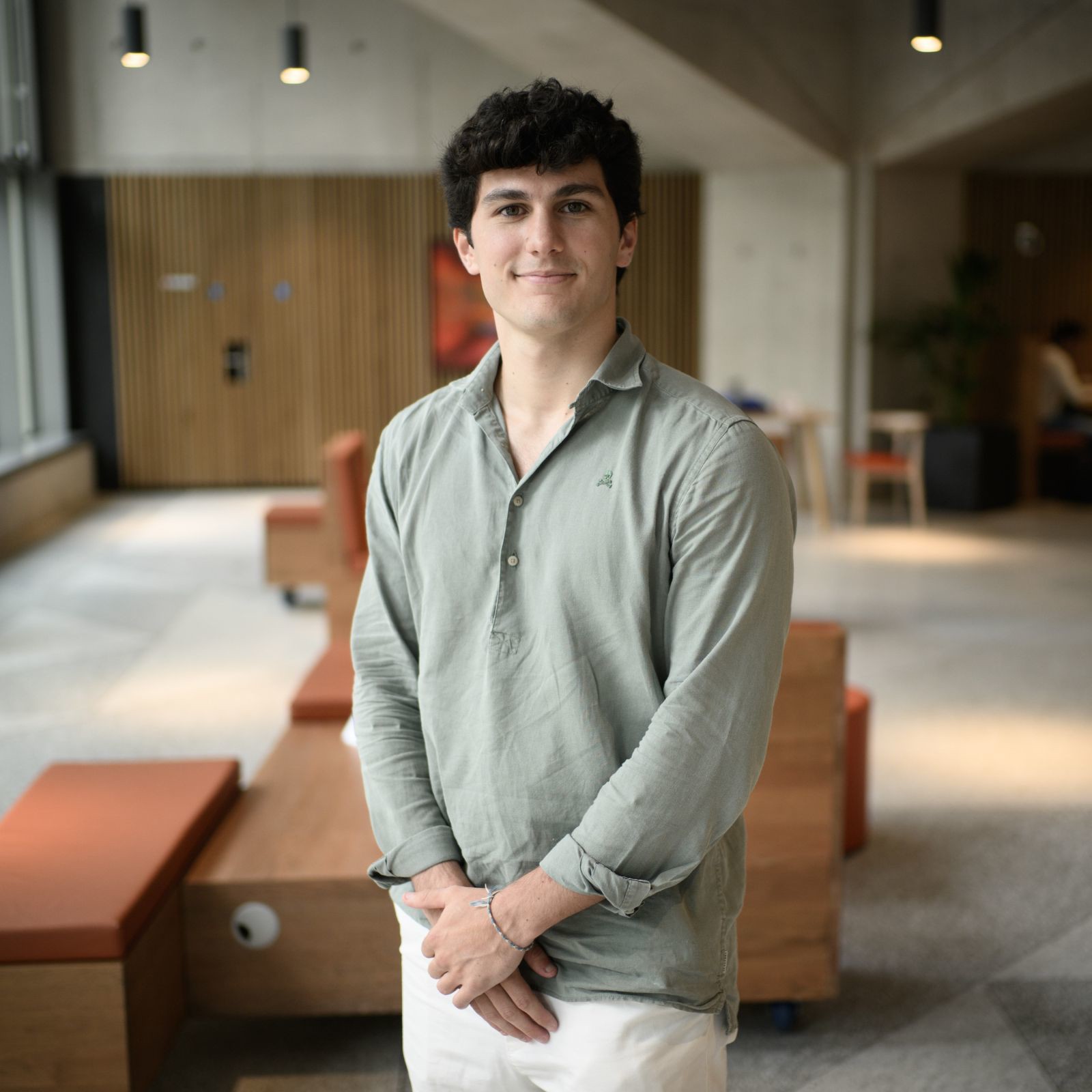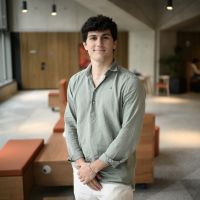5 min read
We sat down with Alex, who took FM350: Advanced Corporate Finance, to learn more about her experience of the course.
Why did you decide to attend LSE Summer School?
Deciding to attend LSE Summer School was one of the easiest decisions I’ve ever made. This programme combined everything that I was looking for in a Summer School, combining the prestige and educational rigour of the London School of Economics, the charm of the campus and the ideal location to enable students to complement study hours with exploring central London. Choosing the LSE Summer School was just the next logical step for me to take in my ambition of delving into finance and it was the ideal place to do so.
Why did you choose FM350?
Although challenging and self-demanding, FM350 is the ideal course to take to dive deep into Corporate Finance. As I am still not very sure about the career path that I would like to take, I figured that it made sense to enrol in this course to find out if finance suited me. I had already taken Accounting and Basic Market and Corporate Finance courses back in my home University, but I wanted to push my knowledge and skills even further.
Tell us about an average day as a student on FM350.
During an average day as an FM350 student, I would wake up around 8:00 to take a shower and have breakfast. I would then quickly read through my class notes and the exercises I did to practice. I would leave my residence at 10:00 to make sure I’d be on campus by 10:30 for the practical seminar. This practice-focused session would usually be about 1.5 hours long in small student groups, and we would solve the practice case given as homework. These classes are highly dynamic as being in focus groups allows you to ask more questions and take time to test your correct understanding of the subject.
After the morning class, I would usually meet with my friends around campus and we would look for a place to grab lunch, or simply head to the on-campus cafeteria.
After a short lunch break, we would usually have the lecture from 14:00 to 17:00. These lectures are covered by passionate LSE teachers – for my course, I was taught by Dr Juanita Gonzalez-Uribe and Dr Ashwini Agrawal. The lectures cover the theoretical concepts of the course and give you a widening view of the world of finance while providing you with the most cutting-edge skillset and knowledge in the industry. During the class, we would also have the opportunity to discuss career opportunities and experience with the teachers.
After the lecture, I would usually go to the library (one of the most astonishing buildings I’ve ever seen on a university campus) to prepare the reading and exercises for the next day’s class, and go over the difficult concepts again. It’s always more fun and effective to do it with a peer as you may help each other and explain the ideas to one another.
Around 18:00, we would usually go for a walk to visit or head to the for a quick tour.
Finally, at 20:00, I would go back to my accommodation and do some exercise or go to the gym to be able to disconnect a little bit. Depending on the workload for the next day, I would do some extra exercises or have a last read before going to bed at 23:00.
What was your favourite part of FM350?
Given that the first part of the programme was based on abstract, although fundamental, concepts of Corporate Finance (Modigliani-Miler Theorem and other developed capital structure approaches) it really helped us to get the basic knowledge to really leverage the second part of the course.
During this second part, we covered the most interesting and revealing topics of the course, going from VC Valuation Techniques, M&A and LPOs/IPOs Assessments, Financial Modelling for Discounted Free Cashflows and NPVs...
I really enjoyed how the two parts of the programme complimented and balanced each other and how the first one provided us with the tools to understand and really profit from the second part. My favourite class of the course covered the valuation techniques in VC and how risk is estimated in the industry.
The exams were very challenging and demanded serious preparation, but I have to say that I really enjoyed putting the knowledge that I acquired to the test.
What advice would you give to students considering FM350?
I would recommend having a background in finance or economics, so you already have prior knowledge and are familiar with the basic concepts, because the course will build on these.
The course covers a wide range of concepts so you will have a deep understanding of the world of corporate finance. To get the most out of the course, you will need to invest some time on you own, before and after classes to prepare and review the ideas covered in class.
This is a high effort, high reward programme, which means that the knowledge you will take out of the course will be as great as the effort and study hours you put into it.
What are your short-term professional goals, and how does FM350 contribute to these goals?
As a 3rd year Business Administration undergraduate student, I am currently looking for an internship in investment banking. This course helped me to widen my horizon in finance and delve into the latest trends in mergers and acquisitions, valuation and capital structuring. I reinforced the prior knowledge I had about corporate finance and leveraged the opportunity to discuss the investment banking sector with my LSE Summer School teacher, who gave us very valuable insights. After discovering the fascinating world of mergers and acquisitions, I was motivated to consider a long-term position in private equity as an M&A Analyst. This course helped me to understand what I really like about finance and fostered my appetite to learn more. It allowed me to consider different career paths and understand the challenges and responsibilities in each one of them.
Was meeting and talking to other students on your course easy?
Talking to my peers and getting to know them was one of the most rewarding experiences on campus. I carried some of the most enriching and passionate discussions with my classmates, that were all very smart and curious and brought up fascinating points I would have never come up with, highlighting the importance of encouraging cross cultural discussions. There was a wide range of nationalities, ages, religions etc. but we were all very happy to help each other out and it made everything about the experience much easier.
How did you find the course and teaching experience at LSE?
The course was very practice oriented, as we learned how to solve real-life situations through case studies.
The teachers demonstrated their passion for the subject they taught and their knowledge in the field. The educators showed sincere concern for our correct understanding of the concepts and our adaptation in general to the programme. They provided very powerful insights and advice for our future careers. They were available to listen to our questions and concerns and were always willing to help. Getting to talk with the lecturers is definitely one of the most valuable things I got from the programme.
What was your favourite part of studying at LSE?
You have the best of both worlds within reach at LSE. LSE combines academic excellence with the charm of central London and the advantage of a classic yet modernized campus. The facilities are perfect for you to perform at your best level and connect with like-minded students. I enjoyed the long study hours at the library, walking through the campus to attend the different lectures, etc.
LSE reunites everything that you need for a comfortable yet challenging learning experience, surrounded by the best and most talented students in the world.
How will the course contribute to your longer-term goals?
On one hand, completing the course with a very good grade (A+, with a final score of 100/100) has helped me to boost my CV with an experience that I know will be very highly considered given the prestige of the London School of Economics. I have found that head-hunters and recruiters in general attribute a lot of importance to the quality of the institutions you have been studying at, so it was very important to me to join an internationally recognised programme.
On the other hand, the course helped me to develop my skillset and encourage my interest in the finance sector even further. It was a fascinating learning experience that enhanced both my hard and soft skills and allowed me to figure out the career path that I wanted to pursue.

